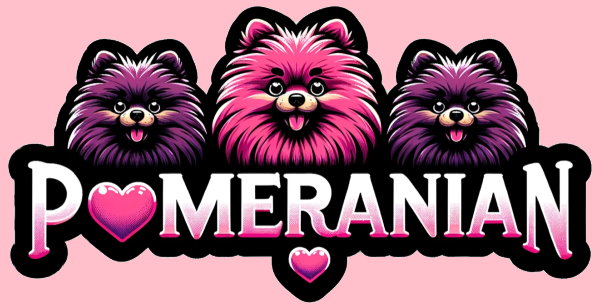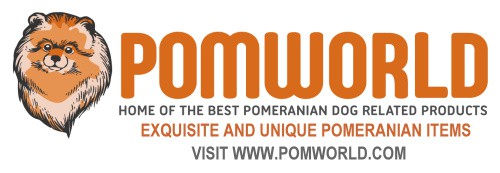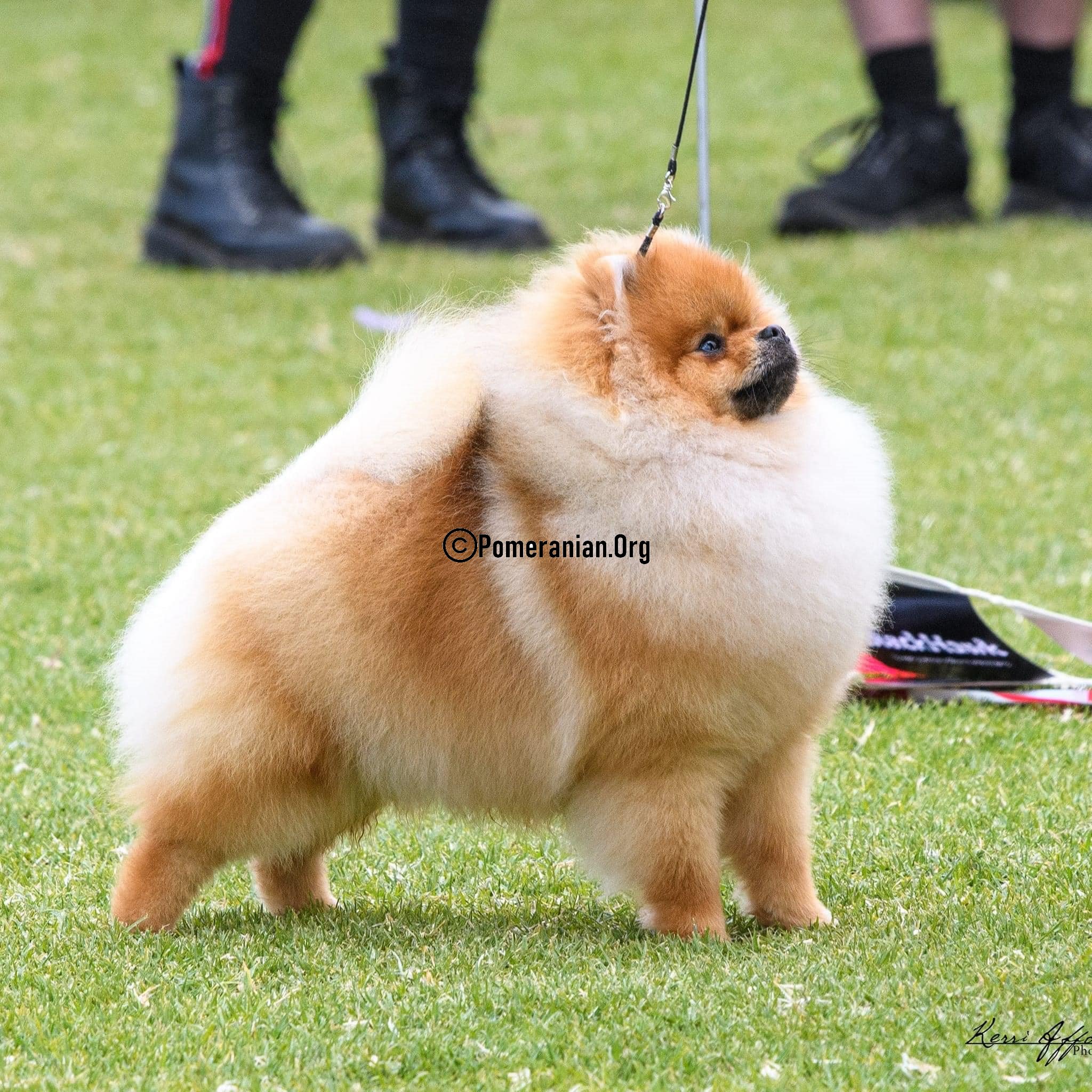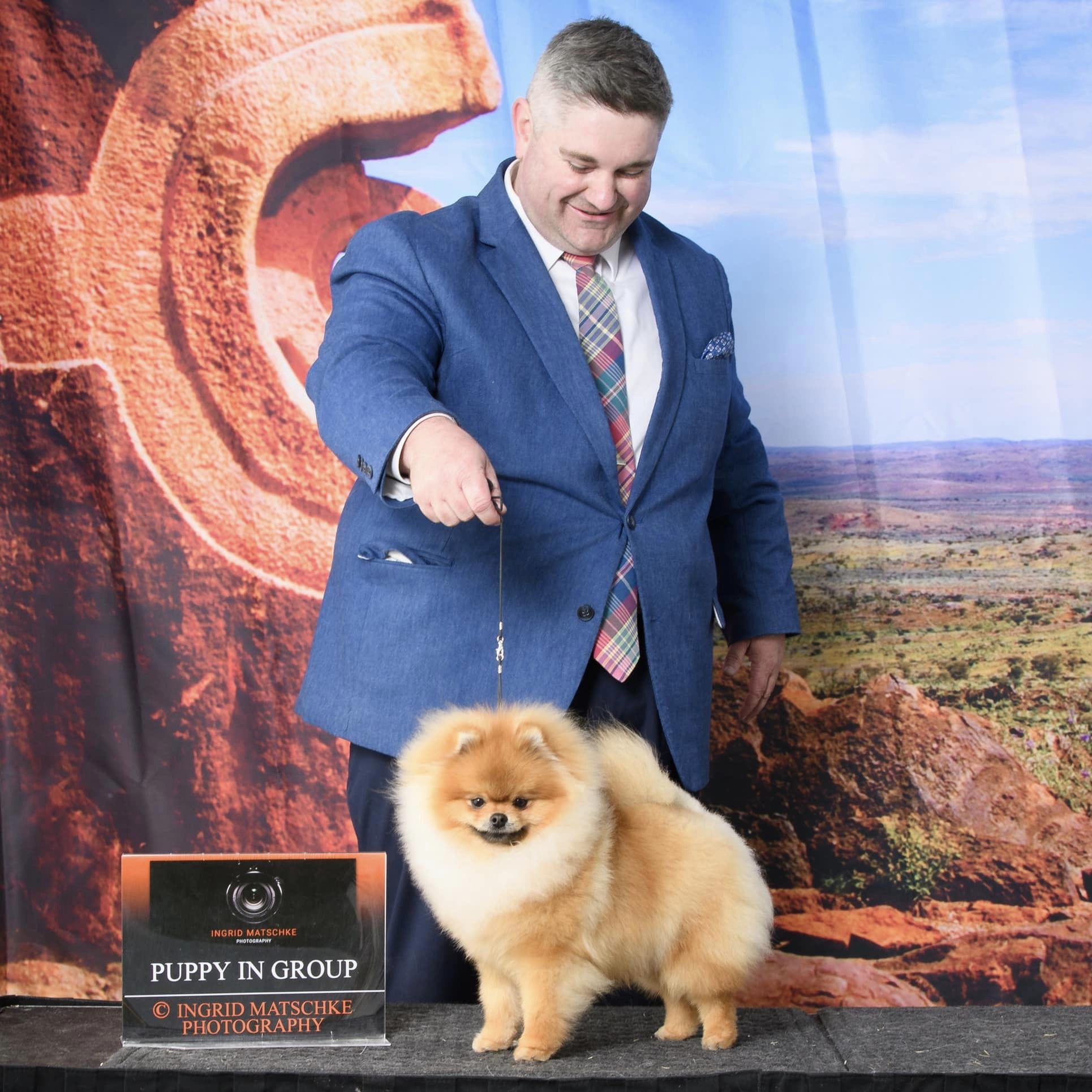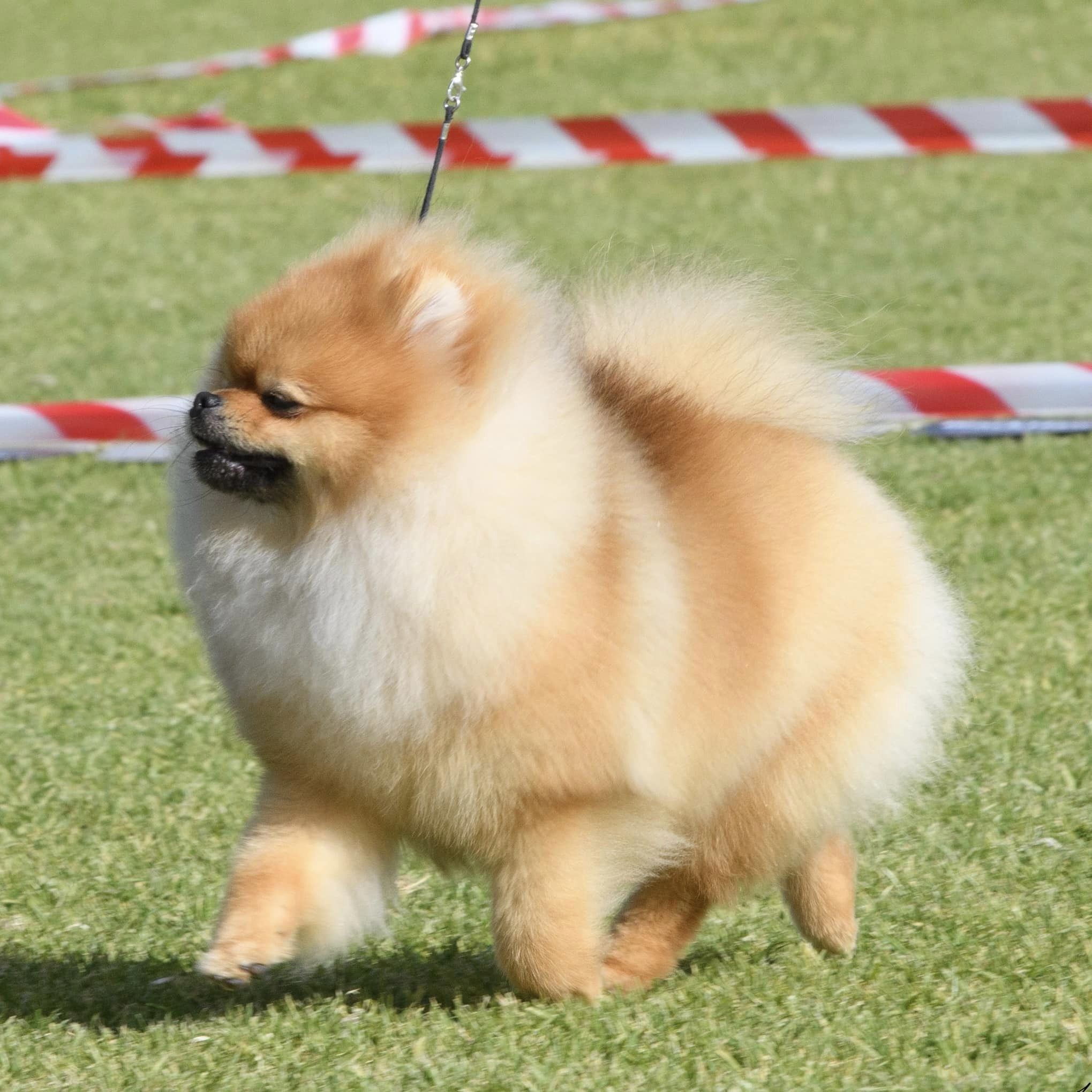Last Updated on 22/07/2021 by Dochlaggie. Post first published on December 30, 2018.
A big THANK YOU to people who open their hearts and homes to a rescue Pomeranian and are happy to adopt a Pomeranian dog. Many of these poor dogs spend their days, and sometimes years, in cages, in backyard breeder properties or puppy mills.
Others get left at kill venues when they get too old, have health problems, if the owners moved, if they barked or peed too much, needed lots of money for vet bills or simply didn’t fit in with other pets or new relationships/households.
Your newly adopted Pomeranian rescue may have been left to live on his own in a crate in a garage or under a porch for a while before even being taken to a shelter or left by the side of a desolate country road.
It’s sad to think what conditions these dogs struggled to live in before coming to you. Many were fenced in with packs of dogs, trying to survive in the harsh elements with little or no contact with human beings. They have never lived in a nice home or felt grass underneath the feet.
Many rescue Poms have poor teeth and may need some pulled out. They’ll often need a shave to get rid of hair that’s become deeply matted. They’ll usually have fleas or ticks or other skin problems that need correcting.
Bringing Home a Pomeranian Rescue
When you bring your new Pom home, he’ll need a complete vet exam and blood tests so he can truly start his brand new better quality life. If you adopt a Pom through a rescue organisation, he may already have had some attention from a vet. Either way, you’ll need to invest lots of time and effort in welcoming him into your life and making him feel safe and happy.
Here are a few tips to help guarantee your new pet understands he’s about to start a good quality life with a loving owner:
Caring Requirements for a Pomeranian Rescue
Rescue Pom Will Need Peaceful Space
The best way to make your rescue Pomeranian feel welcome is to have a big exercise pen in a quiet part of your home where he can feel safe but he can also hear and see you. Put a dog bed, carrier or crate in one corner and add lots of soft bedding, fresh water, pee pads and some fun stuffed toys.
Then he’ll start to feel at home. From his safe haven, he can slowly get to know you and your family and your routine without getting in your way, feeling unsafe or making a potty mess. Let him sleep in this space, stay there if you have visitors, stay there when you go out, feel safe when the TV is blaring and if fireworks or storms happen.
All dogs, especially Pomeranian rescue puppies, need a safe, comfortable, clean space to live in.
Good Nutrition is Crucial to a Rescue Pomeranian Dog
Because a Pomeranian rescue often has lived in rough surroundings, he may be malnourished and have a sensitive digestive system. Work on the “less is more” principle.
Choose good quality food and small kibble as he’s a toy dog. Feed him twice each day, in small amounts and don’t offer treats until he starts adjusting to his new life. If your dog has no teeth or bad teeth, use wet, canned food and remove the gel before you feed him.
Put the food in a container in your fridge and let each meal sit in his dish for 10 minutes to warm a little before feeding him. It’s common for rescue Pom dogs to weigh less than they should and one part of your caring should be to help him slowly gain a little weight.
Feed him small meals four times each day. Slowly increase portion sizes and reduce the number of feeds per day as he gains weight and strength. If he happens to be overweight, use a low fat food. Boiled chicken with no skin can be shredded into tiny pieces. Add a little boiled skinless yam.
These are well tolerated by dogs. Talk to your vet about digestive enzymes, prebiotics and probiotics if your Pomeranian puppy rescue has diarrhoea or an upset stomach.
Vet Care
Your new Pomeranian may need to have blood tests to see how healthy he is and to check if he has worms or ticks. A dental and wellness exam and a stool sample to test for worms is also suggested.
Although your dog does need good quality vet care when you first get him, work out a prioritised action plan. Not everything has to be done at once.
- Vaccinations, grooming, tests, medications and more can be overwhelming for your dog and your bank balance as well.
- First on the list should be tick borne/heartworm and dental issues. But it should be done according to your dog’s current level of health.
- If your rescue Pomeranian needs a deep shave, you must watch for overheating and chills as well as any drafts in his sleeping space. Blankets they can crawl into and out of are useful. A sweater is handy for outside trips but should be removed when inside so he doesn’t overheat.
- It’s law that your dog needs a rabies shot and that should be done asap.
- Neuter/spaying is wise too. Talk to your vet about when is the ideal time for it to be done, according to health and age. If your Pom is in good enough health that your vet can use anaesthesia, then microchipping, ear cleaning and nail clipping can all be done in one go. This avoids your dog having to be stressed about lots of things happening at once.
- The D2PP vaccination is done every three years, but this is also dependent on the age, health risk and environment factors
Do Your Own Research On What is Best Practice Rescue Pomeranian Care
You’re the owner and carer of your new Pom. Ask questions, get second opinions and follow your gut instincts. As time goes by, you’ll get to really understand your Pom and what he feels. Be careful with medication, storage, herbal remedies, etc. and ask your vet if he has any holistic remedies. Ensure you follow all after surgery instructions if that ever happens.
Protect your Rescue Pom
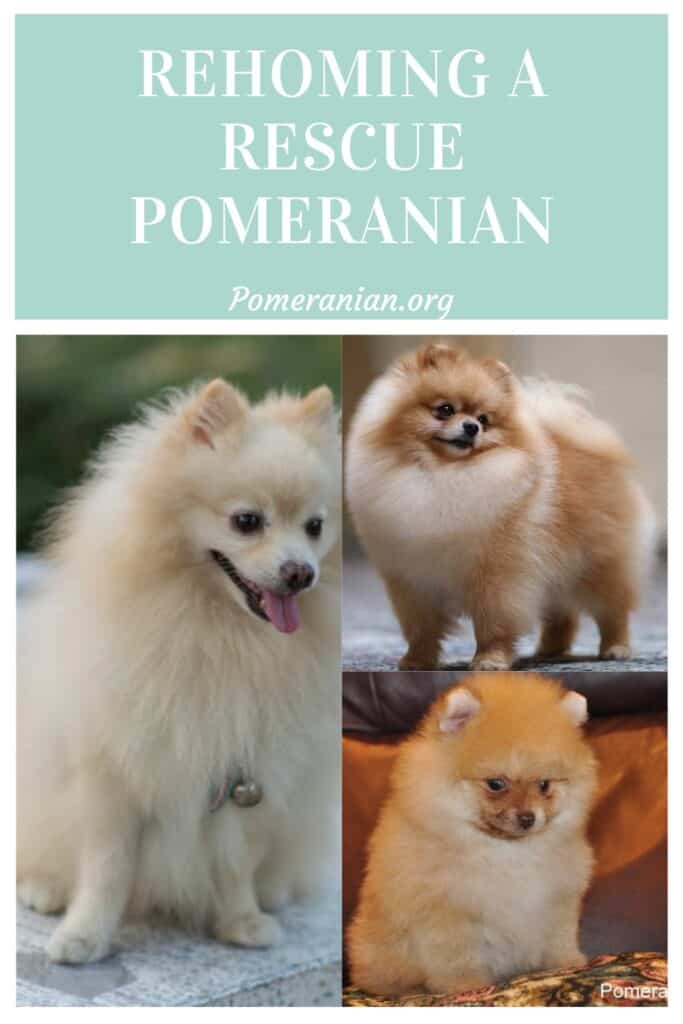
Practice Safe Travel
When taking your Pom in the car, use a strapped in carrier . You never know what make him react differently to normal. Even taking him into the vet, the carrier will help guard against him being nervous and trying to escape.
The carrier is his safe place where he feels protected. Don’t ever leave your Pom in the carrier unattended. He can fall off a bench or table. He can be stolen. He can get overheated or stressed in your car. Other dogs who are loose and/or are aggressive may bite him or even try to take him away.
Ensure Your Home and Yard is Secure
Dog-proof your home and garden to stop him escaping. If you open your door to a friend, he may run through your legs and out onto the road and then get hit by a car. He can get out and get lost easily. Ensure he’s microchipped and that he has tags and your phone number on them.
Use dog barriers to stop him getting to your front or back door. They can limit his access to parts of your home. Keep him in his safe space when you have guests over for parties, barbeques, etc.
Use a leash and harness
The collar can identify him and the harness is good for walking in the yard. It also protects his trachea area and stops toy breeds from choking. Other dogs may be a danger to your Pom. This can include your own other pets so watch what they do when together.
If you already have one or more dogs, they may feel the need to protect their home turf from this intruder. Ensure you supervise them when they’re together until you’re confident that they all accept each other. It only takes a second for one dog to turn vicious.
A rescue Pomeranians can exhibit fear-based aggression or they may be timid and shy towards other dogs, both behaviours may cause problems. This also applies when you’re taking your dog for a walk. If you see an unknown dog, pick yours up to protect him. Your dog won’t win a fight so avoid that happening.
Pay Lots of Attention to Your Pomeranian Rescue Dog
A key component of rehoming a rescue Pom is really getting to know him. He becomes a member of your family and has his own unique personality. You’ll learn what is “normal” and what seems “off” for him.
Pomeranian Rescue dogs often hide their fear, discomfort and pain but you’ll learn to see through that and, once he feels confident that you really care, he’ll relax more. So you’ll be able to treat anything that is wrong when it occurs.
Your home is a brand new environment for your rescue Pom. Know where he is at all times. Is your home “dog-proofed?” Did food fall on the floor that he shouldn’t eat? Did the kids leave the front door wide open so he could run out? Rescued dogs don’t know what they should and shouldn’t do until you teach them. They rely on you to dog-proof your home to make it safe for them to live in.
Have Realistic Expectations of Your Rescue Pom
Your Pom may be terrified, shy, detached or aggressive. Barking, pacing, spinning and stress-related panting may happen. These are normal signs in a rescue dog.
If he doesn’t want you to touch him, sit down and relax and let him come to you. Talk to him kindly and feed him with no pressure. He needs to trust you and you must work to earn his trust, even though he’s a dog. It’s well worth it!
Pomeranian rescue dogs may not understand what toys are but if you get him some squeaky ones and some playful ones, he’ll quickly learn and become interested. Hand feed him canned food and don’t pat him. That’s a way to let him feel safe with you.
The peaceful space helps him relax and bond faster. Give him an aromatherapy collar to calm him and stop the pacing, spinning and panting. Bach Rescue Remedy for Dogs is a good one. (Don’t use the human version as it has alcohol in it.)
Many are so excited that they’re free that they run around the house in a crazy way. They want to go outside and they don’t want to be held. Leave this type of dog with plenty of toys and don’t try to hold him. Eventually he will settle down.
A rescue Pom might be an arm, bed and lap jumper so be careful when you have him. He may love other feisty dogs and will fit into your household quickly.
The Pomeranian Handbook
A Pomeranian who had been abused or neglected may be very clingy as they get used to you. This means he’ll be stressed when he can’t see you. Talk to him so he knows you’re still there. Eventually the sounds of your movements will calm him.
You might have to pat him, hold him and let him sleep in your lap or bed. Do this for a while and then have small sessions where you leave him alone. It will take a while for him to appreciate that this is his permanent, safe home.
Many rescue Pomeranian puppies may never have been forced to hold urge to do potty. They just go wherever they are. It will take time to train him to go outside or to ask when he wants to go out. Dirty drinking water or a lack of water may have caused urinary or kidney issues.
Older dogs are often harder to potty train. Most Poms from backyard breeders and puppy mills go in their cage so they lose their instinct to separate bed from toilet. They may toilet if they’re bored. They mark everything and may never unlearn this habit.
Invest time and patience and you’ll teach him how to go outside. Don’t reprimand him if he makes a mess inside. That scares him and he doesn’t know what he did wrong.
Potty Training Pomeranian Rescues
potty breaks, such as time spent on the carpet playing to discourage the marking. Use their pee pads in their own space. Bands shouldn’t substitute for housebreaking though outside potty breaks and inside ex-pen pee pads.
Misuse of Wiki Wags Brand 12 Small Disposable Male Dog Wraps (Waist: 12"-19")
If you leave the crate open and it has loads of toys and bedding, he can come and go at will. If you ever do have to crate him for a short time, he’ll be ok with it.
Love Will Heal Your Rescue Pom
Rescue Pomeranians have an amazing capability to live for the present and overcome past abuse. Watching them run, jump, bark, smile and play for the very first time is an overwhelming joyful experience.
Because of you, they have a chance to lead a normal life, filled with love and caring, in a comfortable, safe home. They’ll feel such happiness that they’ll soon forget their tragic past life. There’s no greater gift you can give a rescued dog.
Copyright Pomeranian.Org . All Rights Reserved.
References and Further Reading:
[1] Denise Leo “The Pomeranian Handbook”.
